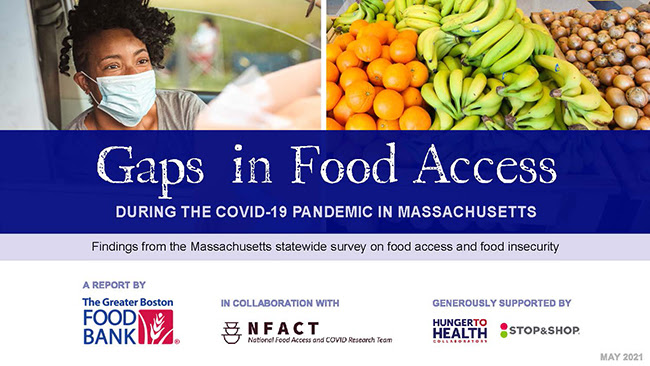A number of updates below! Be sure to register for the Greater Boston Food Bank event on Monday, 5/17.
MLRI Budget Analysis & the SNAP gap included in Senate Ways and Mean budget!
In terms of DTA SNAP and cash assistance benefits:
- directs the Administration to implement changes to address the SNAP Gap by December 2021! Please thank those who made this possible - here's a sample tweet from NASW-MA!
- as with the House budget, proposes a 9.1% increase in TAFDC and EAEDC benefit amounts!
- would eliminate the asset test for EAEDC (currently just $250 for one person, $500 for a couple) and for TAFDC (currently $5,000).
68 SNAP Coalition members sign on to American Rescue Plan SNAP funding letter
Thanks to the American Rescue Plan, Massachusetts will receive nearly $29 million in additional SNAP administrative funds over the next three years. This funding presents significant opportunities for Massachusetts! The attached letter details a set of recommendations from MLRI and Coalition members to EOHHS and DTA, focused on supporting the growing SNAP caseload, reducing the number of eligible families who lose SNAP due to paperwork barriers, more rapidly closing the current “SNAP Gap,” and improving access for the years ahead.
Thank you to all of the organizations who signed on!
Senator Elizabeth Warren files Student Food Security Act to expand SNAP access and address student food and housing insecurity
On Tuesday, May 11th, Senator Warren joined with Senator Padilla, Sanders and Murphy in filing the Student Food Security Act (SFSA). Here's Senator Warren's press release, an NPR story about the bill, and a tweet from Senator Warren about the initiative.The SFSA addresses student hunger by increasing low-income college students' ability to access SNAP, improving data collection and sharing, and creating a new grant program to help colleges and universities support their students. Specifically, the bill:
- Increases low-income college students' eligibility for SNAP by expanding eligibility to students who are eligible for work study, have a $0 Expected Family Contribution, meet the financial eligibility criteria for a maximum Pell Grant, or are an independent student whose household is otherwise eligible.
- Increases outreach to eligible students by requiring the Department of Education to notify students that they may be eligible for benefits when they file their application for federal student aid.
- Requires the Department of Education to collect data on food and housing insecurity.
- Creates a SNAP student hunger demonstration program that would allow students to use their SNAP benefits at on-campus dining facilities at up to ten institutions.
- Establishes a $1 billion per year grant program to help institutions of higher education identify and meet the food and housing security of their students. Grants can be used for research, planning, and implementation of a strategy to conduct outreach to students and coordinate resources. At least 33% of grants must go to community colleges, and institutions with high percentages of Pell recipients, Historically Black Colleges and Universities (HBCUs), and other Minority-Serving Institutions will also receive priority.
Greater Boston Food Bank - Gaps in Food Access During the Pandemic Webinar, 5/17


